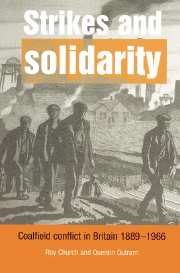Book contents
- Frontmatter
- Contents
- List of figures and tables
- Preface
- List of abbreviations
- 1 Interpreting coalfield conflict: focus and formulations
- 2 Tradition and modernity: the mining industry 1889–1940
- 3 Employers and workers: organizations and strategies
- 4 Employers and workers: ideologies, attitudes and political orientations
- 5 Configurations of strike activity
- 6 Strike participation and solidarity before 1912
- 7 Strikes, organization and consciousness in 1912 and after
- 8 Conflictual context? The ‘isolated mass’ revisited
- 9 Mining and modernity: size, sectionalism and solidarity
- 10 The foundations of strike propensity
- 11 Miners and management: agency and action
- 12 Industrial relations and strikes after nationalization
- 13 International perspectives
- 14 Myths and realities: strikes, solidarity and ‘militant miners’
- General appendix
- List of references
- Index
12 - Industrial relations and strikes after nationalization
Published online by Cambridge University Press: 04 December 2009
- Frontmatter
- Contents
- List of figures and tables
- Preface
- List of abbreviations
- 1 Interpreting coalfield conflict: focus and formulations
- 2 Tradition and modernity: the mining industry 1889–1940
- 3 Employers and workers: organizations and strategies
- 4 Employers and workers: ideologies, attitudes and political orientations
- 5 Configurations of strike activity
- 6 Strike participation and solidarity before 1912
- 7 Strikes, organization and consciousness in 1912 and after
- 8 Conflictual context? The ‘isolated mass’ revisited
- 9 Mining and modernity: size, sectionalism and solidarity
- 10 The foundations of strike propensity
- 11 Miners and management: agency and action
- 12 Industrial relations and strikes after nationalization
- 13 International perspectives
- 14 Myths and realities: strikes, solidarity and ‘militant miners’
- General appendix
- List of references
- Index
Summary
Management, labour and government
With the ending of private ownership after the Second World War, one of the fundamental influences on strike propensity was abolished. In this chapter we explore to what extent the pattern of coalmining strikes altered as a result of nationalization. Our analysis so far has examined the statistical record of miners' local strike activity, described its characteristics, and interpreted both in an attempt to explain strikes in coalmining in Britain between 1889 and 1940. The possibility that the circumstances of industrial development and labour's experience were in some sense unusual in this period, though especially during the depression between the wars, gives special interest to the history of coalmining strikes after the Second World War when the industry was under public ownership and for the first ten years output expanded and then stabilized. Many questions regarding the history of coalmining strikes after 1940 require answers, among which are two of particular importance: did war affect the enduring character of mining strikes which we have established for the preceding period (and which survived the First World War), and did nationalization transform the record of exceptional strike activity among miners? These are the questions of immediate relevance to our study of strikes between 1940 and 1966, when centralized bargaining was adopted nationally under the National Power Loading Agreement (NPLA). However, a search for answers will be facilitated by sketching the background to nationalization and the expectations of its chief architects, and outlining the institutional changes in management and industrial relations under the newly formed National Coal Board (NCB).
- Type
- Chapter
- Information
- Strikes and SolidarityCoalfield Conflict in Britain, 1889–1966, pp. 219 - 239Publisher: Cambridge University PressPrint publication year: 1998



